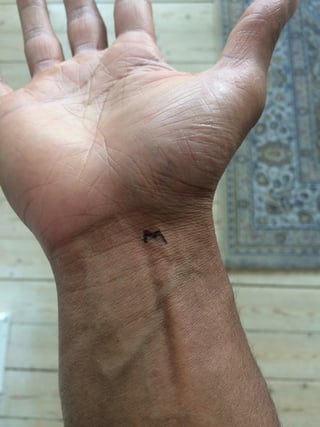This answer is based in the Mahasi Sayadaw Tradition.
Do you have any regular breaks during your day? Like short minute breaks or lunch breaks. If so you could use these breaks as "stations" for re-centering yourself before going back into the storm.
With 12 hour working days it's understandable that there is not much time for formal meditation. The best advice i know of is to carry the practice into your daily life, i.e. to work on staying mindful during the working day. Then how do do that in the middle of a storm?
It's about finding that still-center inside the tornado. In this center there is quiet and silent. That center is your abdomen. The rising and falling of the abdomen will take you back into the present. It will enable you to see things as they are and not to extrapolate on them, e.g. if a stressed out collague of yours decides to yell at you or say something infuriating then by noting it as "hearing, hearing" will let you see this as just being sound. If one is not mindful the mind begins to identify and take ownership of phenomena. It begins to extrapolate on phenomena and based on that cultivate a respons which might be to yell back or take revenge, thereby only adding to the suffering of oneself and others.
To try to avoid these situations and when things get hectic and begin to spin out of control then try to remember to bring your attention back onto the abdomen. Just a few seconds is usually enough to ground oneself in the present and thereby getting a hold of oneself. From there you can then decide how to act accordingly to the situation.
By remembering to center yourself throughout your working day you will be less likely to be tossed around by the waves. When mindful one is interacting instead of reacting to reality.
So to sum up. My best advice is to use your abdomen. Make a firm determination before going to bed in the evening, before going to work in the morning and throughout your working day (that's the hard part) to remember to center yourself by placing attention on the rising and falling sensation of the abdomen. Then note "rising, rising" or "falling, falling" accordingly to the motions of the abdomen.
Back when i was a student i would have stressed out days and a lot of engaging with many people on a regular basis. At these times it would be difficult to remember being mindful. So every morning i took a pen and drew a little "M" on my wrist. I drew it there because i usually looked at my hands during daily activities so then i would see the "M" and instantly turn mindful. It's a great tool to use until mindfulness are so powerful that one does not need it anymore.
I think this method could maybe help you out too.
Then you have 3 methods now.
First one is to make a firm determination to center yourself in evening, morning and throughtout the day. Second one is that you perform the actual centering throughtout your day, e.g. in the shorts breaks or better yet during activites and third one you have a safe guard in form of that little "M" on your wrist in order to remind you to center yourself.
I wish you the best of luck with your practice and your busy day. Remember all phenomena are impermanent. So hang in there and this situation will end too some day. Also never beat yourself up about not having time to practice. Practice accordingly to what your capacity is at a given time. A little practice is better than no practice.
Hope this helps. If you have any questions to what i wrote please let me know.
Click on photos for full size

